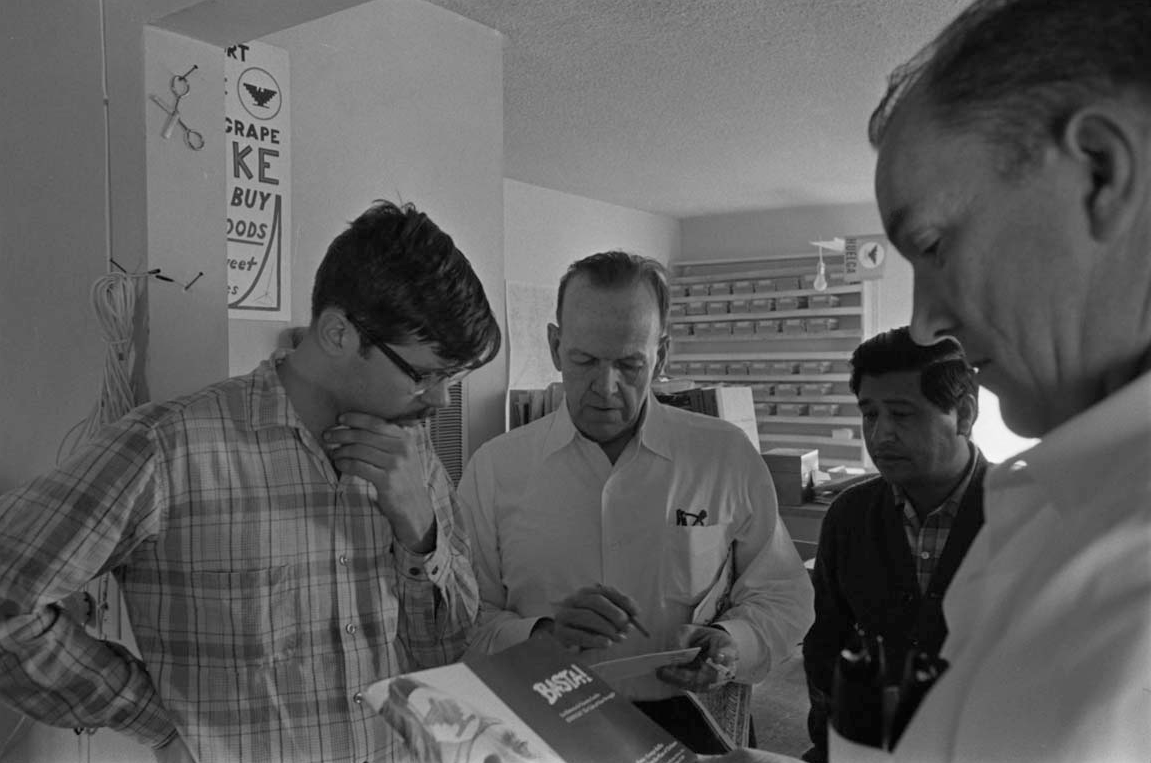Douglas “Doug” Adair
Douglas “Doug” Adair
Doug Adair listens to Jack Conway (out of the frame), in a meeting at El Malcriado, Delano, ca. 1966. Photo by Emmon Clarke.
Douglass (Doug or Pato) Adair was born in 1942 in Princeton, NJ, and graduated from Pomona College with Phi Beta Kappa honors in 1964. He began graduate studies in history on a Woodrow Wilson Fellowship at UC Berkeley that year. In 1965, after Marion Moses challenges him to see for himself what was like to work in the fields, Adair went to the San Joaquin Valley to pick fruit as a summer job, and stayed on in the fall to distribute and write for El Malcriado, the unofficial newspaper of the United Farm Workers.
Adair edited the newspaper after Bill Esher, the original editor, left. Adair created a Texas edition of El Malcriado while he participated in the union work there. In 1970, he was sent to work on the union boycott in Philadelphia with Gilbert Padilla. Adair worked concurrently as a farm laborer until 1977, and wrote for, edited, and distributed the Spanish and English editions of the paper on and off until the paper folded in 1976. In 1977, he purchased a date orchard in Thermal, California, and managed the orchard.
Jack Conway, Daniel de los Reyes, Doug Adair, and César Chávez in a meeting at El Malcriado, Delano, ca. 1966. Photo by Emmon Clarke.
Doug Adair, César Chávez, and Jack T. Conway talking in the office of El Malcriado, Delano, ca 1966
Doug Adair, an unidentified man, César Chávez, and Jack T. Conway are standing and talking in the office of El Malcriado. Conway was executive director of the AFL-CIO’s Industrial Union Department.
A major point of contention between El Malcriado and AFL-CIO officials in 1966 was Governor Pat Brown. The newspaper criticized Brown, who continued to authorize contracted Mexicans to labor in the California fields for two years after the Bracero Program ended, refused to intervene in the 1965 grape strike, and declined to greet the pilgrims on Easter Sunday in Sacramento. According to Frank Bardacke, Bill Kircher from the AFL-CIO usually reached out to Chávez with their objections. Chávez passed along the criticism to editors Bill Esher and Doug Adair or had Dolores Huerta involved. Kircher would also talk directly to Adair, as the two of them got along well. Adair also recalls that Catholic clerics expected deference from the paper and exercised pressure. He also recalls Jim Drake being sent to admonish the paper’s editors.
Tom & Ethel Bradley Center
California State University, Northridge
18111 Nordhoff Street, Northridge, CA 91330
Phone: (818) 677-1200 / Contact Us


